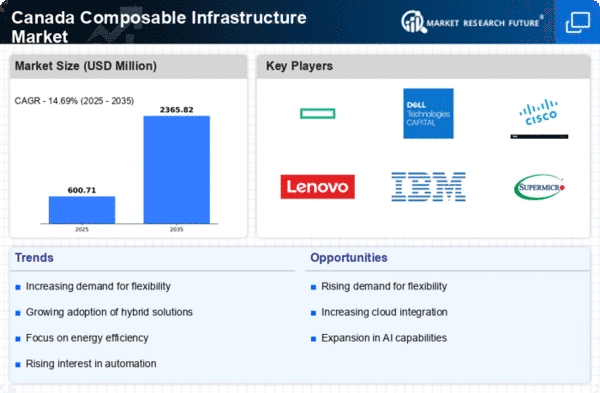Rising Demand for Scalability
The composable infrastructure market in Canada is experiencing a notable surge in demand for scalable solutions. Organizations are increasingly seeking infrastructure that can adapt to fluctuating workloads and business needs. This trend is driven by the necessity for agility in operations, allowing companies to efficiently allocate resources as required. According to recent data, the market is projected to grow at a CAGR of 25% over the next five years, indicating a robust appetite for scalable infrastructure solutions. As businesses expand and evolve, the ability to scale resources dynamically becomes paramount, positioning composable infrastructure as a key enabler of operational efficiency. This rising demand for scalability is likely to propel the composable infrastructure market forward, as organizations prioritize flexibility and responsiveness in their IT strategies.
Shift Towards Cost Efficiency
Cost efficiency is a pivotal driver in the composable infrastructure market in Canada. Organizations are increasingly seeking ways to optimize their IT expenditures while maintaining high performance and reliability. Composable infrastructure offers a compelling solution by enabling businesses to allocate resources more effectively, reducing waste and unnecessary costs. According to market analysis, companies that adopt composable infrastructure can achieve up to 40% savings in operational costs compared to traditional infrastructure models. This focus on cost efficiency is likely to drive more organizations to explore composable infrastructure solutions, as they aim to streamline operations and enhance their bottom line. Consequently, This market is expected to witness substantial growth as businesses prioritize financial prudence in their IT investments.
Integration of Advanced Technologies
The integration of advanced technologies such as artificial intelligence (AI) and machine learning (ML) is significantly influencing the composable infrastructure market in Canada. These technologies enhance the capabilities of composable infrastructure by enabling smarter resource management and automation. For instance, AI-driven analytics can optimize resource allocation, leading to improved performance and reduced operational costs. The market is witnessing a shift towards solutions that incorporate these technologies, as organizations aim to leverage data-driven insights for better decision-making. This trend is expected to contribute to a projected market growth of approximately 30% by 2026, as businesses recognize the value of integrating advanced technologies into their infrastructure strategies. Consequently, the composable infrastructure market is likely to evolve, offering more sophisticated solutions that align with the needs of modern enterprises.
Growing Need for Enhanced Collaboration
The growing need for enhanced collaboration among teams is significantly impacting the composable infrastructure market in Canada. As organizations increasingly adopt remote and hybrid work models, the demand for infrastructure that supports seamless collaboration has intensified. Composable infrastructure facilitates this by allowing teams to access and share resources dynamically, fostering a more collaborative environment. Recent surveys indicate that over 60% of Canadian businesses prioritize collaboration tools in their IT strategies. This trend is likely to drive the adoption of composable infrastructure solutions, as organizations seek to enhance productivity and teamwork. As a result, the composable infrastructure market is poised for growth, with a focus on solutions that enable effective collaboration across diverse teams and locations.
Increased Focus on Security and Compliance
Security and compliance are becoming critical drivers in the composable infrastructure market in Canada. As organizations increasingly adopt digital transformation strategies, the need for robust security measures and adherence to regulatory standards has intensified. The composable infrastructure market is responding to this demand by offering solutions that prioritize security features, such as enhanced data protection and compliance management tools. Recent studies indicate that nearly 70% of Canadian enterprises consider security a top priority when selecting infrastructure solutions. This heightened focus on security is likely to shape the market landscape, as vendors innovate to provide secure and compliant composable infrastructure options. As a result, organizations are expected to invest more in these solutions, further propelling the growth of the composable infrastructure market.
















